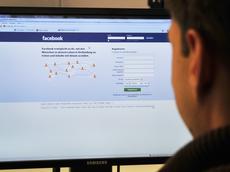Is Facebook massively overvalued?
Facebook is worth at most half as much as has hitherto been assumed. This is revealed by a new calculation model created by the two ETH Zurich researchers Peter Cauwels and Didier Sornette and used by them to re-evaluate the social network's market value.

The two researchers estimate Facebook’s effective corporate value to lie between 15 and 33 billion US dollars. However, figures of 66 to 100 billion are circulating in the business media. Peter Cauwels says, “Clearly, there is an over-estimation. As a result, there may be the risk of a new financial bubble in the making based on the anticipation of unlimited future growth.” This has happened once before with the internet bubble. Most of the valuations that are currently circulating are based on rumours. Cauwels stresses that, “To bring some substance to the debate, we developed a model with which we can better estimate the value of social networks, taking into account limitations to growth, such as a limited amount of computers or, a fortiori, a limited amount of inhabitants of our planet.”
Together with Professor Didier Sornette from the Chair of Entrepreneurial Risks at ETH Zurich, Cauwels calculated Facebook’s value based on, among other things, the growth of the user numbers. After a steep rise, suggesting unlimited growth, the growth in user numbers seems to plateau. Around 750 million people worldwide are currently signed up to Facebook. Cauwels says, “We observed an S-shaped growth curve which is clearly a sign that Facebook will not continue to grow like that for ever, and saturation is now setting in.” The scientists also took into account the net profit per Facebook user, which is currently one US dollar. However, no official figures are available for this, so the scientists had to rely on estimates circulating in the financial media such as Reuters and Bloomberg.
“Only” worth 15.3 billion dollars
If the researchers calculate Facebook’s value on the basis of the current development of user numbers – which will not exceed one billion – the social network is worth 15.3 billion US dollars. In an intermediate scenario with a large growth in users and a future user number exceeding one billion, Facebook would be worth 20.2 billion US dollars. In a scenario with extremely large growth, which equates to almost 2 billion users, the network’s value would amount to 32.9 billion US dollars.
According to their model, Facebook would need to increase its profit per user, before the IPO, by a factor of 3 to 6 in the base case scenario, by a factor of 2.5 to 5 in the high growth scenario and by 1.5 to 3 in the extreme growth scenario, if the company wants to meet current widespread high expectations.
Financial mathematics coupled with physics
Cauwels and Sornette’s valuation is based on the concept of discounted cash flows. The economic value of social networks primarily lies in advertisements and in the user profiles and data that can be used for advertising purposes. Since Facebook has no other assets than its users and the advertising earnings associated with them, all that is required is to calculate the company’s value based on the average profit per user and the number of users. Cauwels says that, in order not to devalue the company unnecessarily, most parameters were chosen favourably for Facebook. For example, a discount rate of only five percent was chosen.
A new dot-com bubble
Facebook’s capital was beefed up significantly in January 2011. The platform is now backed by more than 500 investors. As a result of that, the company will have to disclose its financial results. Cauwels estimates that, “When companies have to go through that process, the next step to an actual IPO is not that far off.” Facebook must disclose financial statements in April 2012, and the ETH Zurich researcher expects the billion-dollar empire to go public after that.
Banking specialist Cauwels says the possibility of Facebook turning into a speculative bubble is not solely a problem for the platform itself. The organisations that are investing in Facebook expect fat profits from the IPO.
He says “Investors even make profits by helping a business at the time of its IPO.” For example, the discount platform www.groupon.com paid administrative fees of more than 30 million US dollars to the investment banks that helped it float on the stock market.
The paper by Cauwels and Sornette, which will appear shortly in the journal Portfolio Management, also looked closely at Groupon. Only a few months ago, the value of this Internet company was estimated at 30 billion US dollars, an amount which seems far removed from reality. According to more recent information provided by the company to the Securities and Exchange Commission, shares will be issued at a price of 17 US dollars, corresponding to a total value of 11 billion US dollars. As it happens, Groupon is in the red, having already made a loss of 170 million US dollars this year.







READER COMMENTS